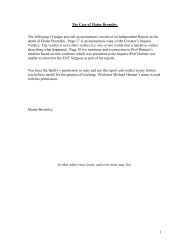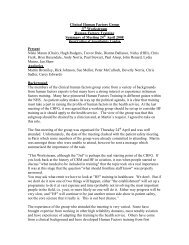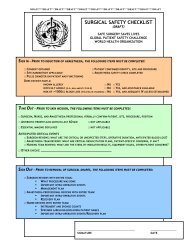The Essentials of Patient Safety - Clinical Human Factors Group
The Essentials of Patient Safety - Clinical Human Factors Group
The Essentials of Patient Safety - Clinical Human Factors Group
Create successful ePaper yourself
Turn your PDF publications into a flip-book with our unique Google optimized e-Paper software.
<strong>The</strong> <strong>Essentials</strong> <strong>of</strong> <strong>Patient</strong> <strong>Safety</strong><br />
Teams create safety<br />
Healthcare is delivered by teams <strong>of</strong> people rather than by individuals. Even when a<br />
patient has a particular relationship with their family doctor, surgeon or nurse, that<br />
person is supported by a network <strong>of</strong> people who are essential for the delivery <strong>of</strong> safe,<br />
effective care. Teams, like individuals, may erode or create safety. A team that is<br />
working poorly multiplies the possibility <strong>of</strong> error. Conversely teams, when working<br />
well, have the possibility <strong>of</strong> being safer than any one individual. A team can create<br />
additional defences against error, by monitoring, double checking and backing each<br />
other up; when one is struggling, another assists; when one makes an error, another<br />
picks it up.<br />
If you work in a team, as we almost all do, you may not think much about how<br />
it functions and what factors make a team work well. Some days, everything just<br />
<br />
team is fragmented, every communication seems to be misunderstood, the work takes<br />
o blame<br />
others for being difficult or obstructive, which people sometimes are. However, in<br />
healthcare, if we look a little deeper we see that there is a fundamental underlying<br />
problem; teams are not designed, teamwork processes are not specified and the whole<br />
system relies on goodwill and the native resilience and adaptability <strong>of</strong> healthcare staff.<br />
Team interventions: briefing, checklisting and daily goals<br />
Watching teams and teamwork quickly reveals that a group <strong>of</strong> well intentioned<br />
individuals does not make a team and further, that teamwork has to be planned and<br />
organised. In some studies <strong>of</strong> urology and general surgery up to a third <strong>of</strong> standard<br />
team tasks <strong>of</strong> standard communication and the checking <strong>of</strong> equipment were not<br />
completed (10, 11). Improving team training is one possible response to such<br />
problems. However there are other, simpler, approaches which turn out to have quite<br />
pr<strong>of</strong>ound effects.<br />
Clarity and communication: the adoption <strong>of</strong> daily goals<br />
Recall the case <strong>of</strong> David James who died from a spinal injection <strong>of</strong> vincristine. One<br />
<strong>of</strong> the features <strong>of</strong> this case was that almost everyone involved made assumptions<br />
about the knowledge and abilities <strong>of</strong> those around them. We assume, by default, that<br />
other people have the same understanding <strong>of</strong> a situation as we do and, even worse,<br />
that we have correctly communicated our intentions and wishes. Many instructions<br />
for patient care are given rapidly, in a hurry, <strong>of</strong>ten in a kind <strong>of</strong> clinical shorthand and<br />
with many assumptions about the kind <strong>of</strong> basic care that will be provided. In a fixed<br />
team that works together day in and day out, this generally works pretty well.<br />
However few teams, especially ward teams<br />
people on a variety <strong>of</strong> shift patterns, supported to varying degrees by temporary staff.<br />
Peter Pronovost (12) posed two simple but critical questions to intensive care<br />
doctors and nurses after the daily rounds: (1) How well do you understand the goals<br />
<strong>of</strong> care for this patient today And (2) How well do you understand what work needs<br />
to be accomplished to get this patient to the next level <strong>of</strong> care <strong>The</strong>se questions seem<br />
unnecessary, almost insulting. <strong>The</strong>se people are caring for very sick patients; surely<br />
they know what they are meant to be doing A formal survey revealed however that<br />
only 10% <strong>of</strong> nurses and doctors surveyed understood the goals <strong>of</strong> care for specific<br />
patients.<br />
41








